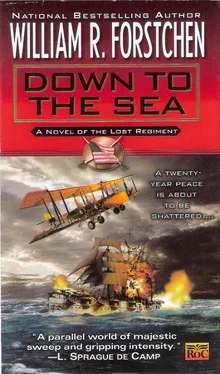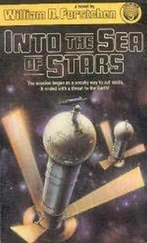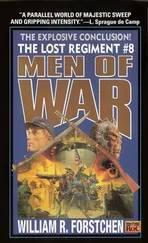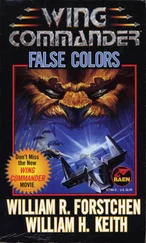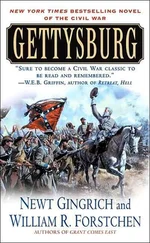William Forstchen - Down to the Sea
Здесь есть возможность читать онлайн «William Forstchen - Down to the Sea» весь текст электронной книги совершенно бесплатно (целиком полную версию без сокращений). В некоторых случаях можно слушать аудио, скачать через торрент в формате fb2 и присутствует краткое содержание. Год выпуска: 2014, Жанр: Фантастика и фэнтези, на английском языке. Описание произведения, (предисловие) а так же отзывы посетителей доступны на портале библиотеки ЛибКат.
- Название:Down to the Sea
- Автор:
- Жанр:
- Год:2014
- ISBN:нет данных
- Рейтинг книги:5 / 5. Голосов: 1
-
Избранное:Добавить в избранное
- Отзывы:
-
Ваша оценка:
- 100
- 1
- 2
- 3
- 4
- 5
Down to the Sea: краткое содержание, описание и аннотация
Предлагаем к чтению аннотацию, описание, краткое содержание или предисловие (зависит от того, что написал сам автор книги «Down to the Sea»). Если вы не нашли необходимую информацию о книге — напишите в комментариях, мы постараемся отыскать её.
Down to the Sea — читать онлайн бесплатно полную книгу (весь текст) целиком
Ниже представлен текст книги, разбитый по страницам. Система сохранения места последней прочитанной страницы, позволяет с удобством читать онлайн бесплатно книгу «Down to the Sea», без необходимости каждый раз заново искать на чём Вы остановились. Поставьте закладку, и сможете в любой момент перейти на страницу, на которой закончили чтение.
Интервал:
Закладка:
Captain Gracchi nodded, running fingers through what was left of his thinning mane. “Come on, lad, let’s look at your fire.”
Even when awakened in the middle of the night, Gracchi always had a calm, fatherly manner. It was usually then as well that he lapsed into calling Cromwell, and a few chosen others, lad. He shuffled out of the cabin and onto the bridge, Cromwell respectfully following.
Picking up a set of glasses hanging next to his chair, he braced his elbows on the railing and scanned forward. After the light of the cabin, Cromwell had to squint for a moment, letting his eyes adjust again to the darkness before he could see the glowing patch of red on the horizon.
“Current position?” Gracchi asked, and Cromwell, anticipating the captain’s request, had the chart up, the latest hourly passage marked off.
He nodded, eyeing the chart. They were five hundred miles beyond “the line,” the division created by treaty with the Kazan nearly fifteen years ago. There were no markers, islands, or territory to define it, simply a line traced across a map beyond which both sides had agreed not to tread.
The agreement had come after President Keane’s first term in office. Keane had vehemently argued against it, declaring that if the Kazan were so insistent that no one venture farther out, that must clearly indicate that they had something to hide, or worse, to conceal until such time as they wished to reveal it.
Opinion in the navy was divided. Some, including Admiral Bullfinch, had declared that until such time as the Republic could truly muster a significant fleet, it was best to observe the agreement and to quietly build. But the building had been slow. The entire fleet still only numbered nine armored cruisers. Gettysburg was the newest, and three more sister ships were ready to be fully commissioned by the end of the summer.
Thus it had come as a surprise to everyone on board when Gracchi announced, as soon as they had put to sea, that they had been issued secret orders directly from President Keane to sail beyond the line and, as he put it, “poke around a bit.”
Gracchi lowered the glasses for a moment, examined the chart, grunted, then raised the glasses back up.
A minute or more passed, Gracchi muttered to himself, as was his habit. Some in the crew thought it a clear sign that the old veteran was slipping. Cromwell had no opinion about it. A man of intelligence never passed opinions on captains, they simply obeyed and survived. Gracchi was the captain, and if he wished to mutter that was his right.
Compared to some of the others in command, muttering was an idiosyncrasy Cromwell could deal with. He had heard the stories about Captain Feodor, who had been quietly removed from command after his crew reported that he had taken to climbing the rigging at night in order to talk to the saints. Then there was the infamous case of Captain Xing, who, after six months of cruising on a survey mission, without once hailing another ship or sighting land, had simply pulled out a revolver, blew out the brains of his first lieutenant and chief petty officer, then flung himself over the railing, where the sharks which always trailed the ships, made quick work of him.
Command created a certain level of madness at times in the fleet, and Gracchi’s muttering, if it went no further, was nothing. Besides, Gracchi was one of the survivors of the Great War, and for that alone he deserved respect.
“That’s a city burning,” Gracchi finally announced, lowering his glasses to look at Cromwell. “Seen it more than once back in the war.” He sighed, shaking his head. “The other flashes…I’d say it’s a fight, one hell of a fight.” Cromwell, having learned from the beginning of life that when unsure it was best not to speak, remained silent.
Gracchi looked off absently. “We’ve come out here to scout around a bit, Mr. Cromwell, and I think we’ve found something. I take it you’ve heard the rumors about what that merchant ship, the Saint Gregorius, claimed it found.”
“Yes, sir.”
Everyone had heard. It had been the hottest topic of conversation ever since Gracchi had spoken to the crew about their mission.
“Well, son, I think we’ve found another city getting sacked. I can feel it. You can almost smell it.
“I think we’ve stumbled into a war. After all these years we’ve finally found them.
“Mr. Cromwell, I suggest we beat to quarters. Roust out the chief engineer yourself and tell him to fire up the boilers. I want a full head of steam if we need to maneuver. Get the sailing master while you’re at it. Have him draw in all sails. We’ll run on steam alone.”
Gracchi began heading back to his cabin, then turned. “And damn it, boy, have someone get me some tea.”
Cromwell saluted.
The armored cruiser Gettysburg was a sleeping ship on this, the midnight watch. The only ones topside were the bridge crew, lookouts, and the watch officer.
Within seconds all that changed. Cromwell shouted for the petty officer to pass the word to beat to quarters. The petty officer raced aft, leaping down the gangway to the main gun deck below, while Cromwell went forward, gaining the open hatch to the fo’c’sle, officer territory.
Gracchi had told him that only a short generation ago the domain of officers had been aft, where the following breeze was still fresh and the open quarterdeck a place for the high and mighty to take the morning air. All that was gone on this long-ranging armored cruiser. Though it still might sport sails, twin engines were mounted just aft of the midships, massive boilers and pistons, over seven hundred tons of ironworks to power the twin propellers. Aft was now a place of steam, coal bunkers, grease, and heat, and forward was where fresh breezes and relative quiet reigned.
Taking the steps two at a time, he landed on the main deck, and raced past the tiny cubbyhole cabins of the eight midshipmen, four ensigns, and his superiors. Pausing at Chief Engineer Svenson’s cubicle, he pound on the door, shouted the captain’s orders, and moved on to the sailing master, then down the corridor for good measure, making sure the rest were up as well.
Within seconds Svenson was out of his cabin, trailed by a faint scent of brandy and a couple of ensigns, one of them very unsteady. Gaming dice were on Svenson’s bunk. One by one the midshipmen piled out, filled with questions. Cromwell simply pointed them topside, shouting for them to move smartly and get up there ahead of the men they commanded.
Stopping at his own cabin, he popped the door open, leaned in, and shoved his sleeping roommate, Sean O’Donald. “Come on, Irish, we’re wanted topside.”
Sean rolled over, sat up groggily and rubbed his eyes. “What? What time is it?”
“Move it!”
Richard raced back out the door and joined the rush of men pounding up the stairs. Aft he could hear pipes shrieking, echoing down the corridor. The crew was coming awake.
It always amazed him how a ship could be so quiet one moment and absolute bedlam the next, then within minutes the bedlam would give way to a steady, disciplined silence as men reached their stations and set to work.
Though he longed to be on the bridge, to hear what Gracchi was saying about the light, Cromwell went forward. His battle station was the lone scout aerosteamer, positioned at the bow. There had been two of them, but poor Sean, flying the second plane, had snapped off a pontoon on a bad landing. It was a common enough occurrence, especially when the seas were running high, but the accident had shorted them one of two precious planes, and the normally placid Gracchi had been none too kind to O’Donald when they had finally fished him out of the drink.
Flying a scout plane off of a cruiser was an extremely hazardous job. Flying itself was nearly suicidal, even without trying to take off from a ship at sea and then survive the landing.
Читать дальшеИнтервал:
Закладка:
Похожие книги на «Down to the Sea»
Представляем Вашему вниманию похожие книги на «Down to the Sea» списком для выбора. Мы отобрали схожую по названию и смыслу литературу в надежде предоставить читателям больше вариантов отыскать новые, интересные, ещё непрочитанные произведения.
Обсуждение, отзывы о книге «Down to the Sea» и просто собственные мнения читателей. Оставьте ваши комментарии, напишите, что Вы думаете о произведении, его смысле или главных героях. Укажите что конкретно понравилось, а что нет, и почему Вы так считаете.
